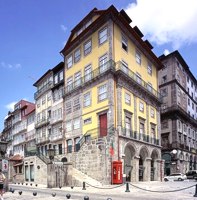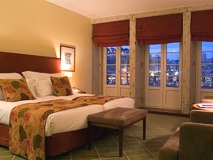|
|
|
|

The Pestana Porto Hotel,
formerly the Porto Carlton, is situated on the river side in the old area
of Porto looking across to the famous view of the river boats and the Port
Wine houses on the south side.

The hotel is in Praca da Ribeira and is a conversion of old houses, some dating from the 16th century. The remains of the old mediaeval city walls form part of the building. Recent excavations have found that Praca de Ribeira was created on the site of a very old dock from the days when commercial vessels used the river as a port. The old houses of the area have been recognized by UNESCO and given World Heritage Site status. The hotel is surrounded by small restaurants in the old buildings. Guests should take the opportunity to walk across the old iron two level bridge to visit the Port Wine lodges on the south bank in Vila Nova de Gaia. Nearly all of the wine lodges
have guided tours which explain the fascinating process that is required
to make the world famous port wine.
The law on Port Wine production
requires that the blending to make the product takes place in a defined
area of Vila Nova de Gaia or, nowadays, on the grape growing 'quintas'
upriver. No Port Wine is produced in Porto itself which is on the north
bank of the river.
All the rooms have private bathroom, air conditioning and heating, direct dial telephone, satellite television, radio, safe, mini bar and hairdryer. The deluxe rooms and suites are the most sought after since they also have views over the Douro River. The bar and other public rooms are furnished to provide an elegant and relaxing atmosphere. The hotel's 'Vintage Restaurant'
offers a range of regional and international dishes from an 'A la
Carte' menu.
Facilities at the Pestana Porto Hotel include elevator, non-smoking rooms and a room for disabled persons. There are also 4 conference rooms suitable for up to 90 people, all with audio-visual equipment. In the days of the Discoveries, the fleet used to leave Porto and the Douro river for the newly discovered lands of America, Brazil and the Far East. Before they left, they used to buy all the meat available in the city. As a result the wives and
children left at home only had the offal to eat. To this day the people
from Porto are known as 'Os Tripeiras' (tripe eaters). One of the specialty
dishes in the restaurants worth trying is 'Tripas a moda do Porto'.
During the Peninsular Wars it was from here that the Duke of Wellington (then Lord Wellesley) directed the crossing of the Douro River to take Porto which was held by Napoleon's army. It was before the iron bridge was constructed and the bridge was a line of boats lashed together with the road running across on top. Napoleon pulled all these boats to the Porto side to deny the bridge to Wellington. Napoleon expected the usual tactic of a crossing near the sea supported by the fire af the naval fleet. Wellington and his troops marched overnight from the south and reached the Douro River in the early morning, he took up position at the monastery and sent scouts along the south bank of the river to report back. The scouts returned from a mile or so up river, and told Wellington that they had met a Portuguese man who had told them where two boats were hidden. These were used to send a small detachment across and take a monastery on the Porto side up river. The first counter attack failed and so Napoleon moved most of his army upriver to drive back this small crossing. The inhabitants of Porto seized this opportunity to use the boats in Porto to go across the river in front of the hotel and bring the British army across. The battle was won by lunchtime and Wellington was able to eat the evening meal that the chefs had started to prepare for Napoleon. |
| Click here for reservations, information and advice |
|
|
|||
|
|
|
|
|
|
|
|
||
|
|
|
|
|
| Pousadas | Manor Houses | Cottages | Villas |
| PORTUGAL - ACCOMMODATION BY TYPE | |||
| Portugal hotels | Pousadas | Manor Houses | Portugal inns |
| Portugal villas | Portugal cottages with shared pool | Golf Courses | |
| PORTUGAL - ACCOMMODATION BY REGION | |||
| Algarve | Alentejo | Lisbon Coast | Tagus Valley |
| Beiras | Porto and Douro | Alto Minho | Azores and Madeira |
| SPAIN | |||
| Paradores of Spain | |||
| Manor
Houses of Portugal
Click for information about us |
Return to Portugal hotel index |